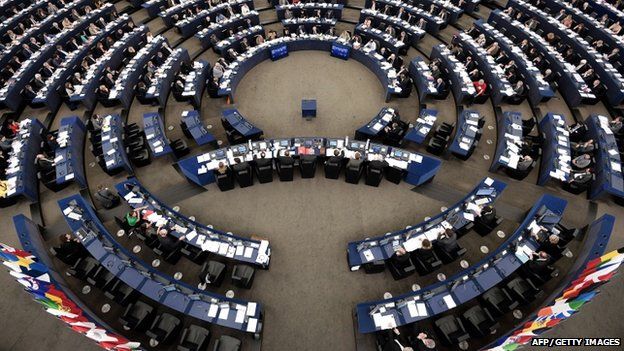European election: What's at stake for Wales?
- Published

You might not have heard much about the 2014 European election - but it is happening in Wales and across the European Union in May. So what's it all about? Who can you vote for? What are the issues? And how do you vote? We explain what you need to know.
When and what is it?
The European Parliamentary elections take place across the 28 member states of the European Union (EU) between 22 and 25 May.
There will be 751 seats up for grabs, with 73 of those coming from the United Kingdom - including four from Wales.
UK residents will be voting on Thursday, 22 May, and the MEPs elected will represent them in the European Parliament for the next five years.
What have my MEPs ever done for me?
Read the papers and you might be forgiven for thinking MEPs spent their time thinking up new laws about straight bananas or the size of olive oil jars.
In reality the parliament has significant powers, which now include the ability to veto the seven-year budget set by the leaders of the 28 member states.
If you have an issue with a European law, you can contact your MEP in the same way that you'd contact your AM for a devolved issue, or your MP for a Westminster matter.
As well as having a role in setting the budget and the EU's spending priorities - including the billions of pounds in economic aid that come to Wales - MEPs decide EU-wide laws on issues like the environment, employment law and trade.
Welsh MEPs divide their time between Wales and the parliament in Brussels and Strasbourg.
What happened last time?
In the 2009 European election, the Conservatives topped the poll in Wales - the first time Labour had failed to come first in a Wales-wide election since 1918.
The result meant the Conservatives, Labour, Plaid Cymru and UKIP each sent one Welsh MEP each to Brussels; a net loss of one for Labour and a gain of one for UKIP, their first success in a Wales-wide election.
Does all this mean we are staying in the EU?
That is an issue for another day - although we can expect to hear plenty during the campaign about whether Britain should stay in the EU or pull out.
This will be an election for members of the European Parliament - you will not be asked your opinion on membership of the EU on the ballot paper.
Prime Minister David Cameron has proposed a referendum on EU membership - but only if the Conservative Party wins the 2015 UK election.
A BBC Wales/ICM poll for St David's Day 2014 suggested that 54% of people in Wales thought the UK should stay in the EU while 40% believed we should pull out.
But a survey of Welsh voters by Beaufort for the Western Mail in July 2013 found 37% of those questioned would vote in a referendum to leave the EU while only 29% would vote to stay.
How do I vote?
First, you need to ensure you're registered to vote.
If you're not registered, or you're unsure, you can contact the Electoral Commission.
You can apply for a postal vote, but you must do this by 17:00 BST on 7 May. You can also nominate someone to vote on your behalf and you must do the paperwork for this by 17:00 BST on 14 May.
Most people still vote on polling day itself, with polling stations opening at 07:00 BST and closing at 22:00 BST.
However, the results can only be declared after 21:00 BST on Sunday, 25 May. That is because polling day in a number of European Union countries takes place on a Sunday.
You have one vote, which you cast for the party you wish to vote for.
The voting system is a version of proportional representation called a closed list system.
The four Welsh seats will be distributed based on the number of votes cast - the parties have already selected which candidates would be elected if they win one, two, three or four of the seats.
To find out more on the European election, go to European Parliament's information page.
- Published24 September 2015
- Published3 March 2014
- Published27 February 2014
- Published28 February 2014
- Published8 November 2013
- Published19 October 2013
- Published13 July 2013